“Me”
Here’s another of the DPP homework assignments for this month, focusing on anatta (the Buddhist teaching of “not-self.”)
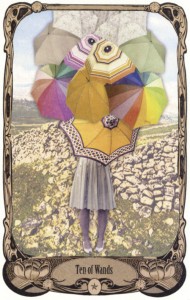 Make a list of the various identities you catch yourself assuming in the course of a day, both the identities you assume in dealing with other people, and the identities you assume in your internal conversations. (Who is talking to whom in your mind?) Try to notice which events cause you to switch from one identity to another.
Make a list of the various identities you catch yourself assuming in the course of a day, both the identities you assume in dealing with other people, and the identities you assume in your internal conversations. (Who is talking to whom in your mind?) Try to notice which events cause you to switch from one identity to another.
OK. Here goes:
The Very Dedicated Buddhist Practitioner.
The Woman of a Certain Age.
The Enthusiastic Student of All Things Italian.
The Creative Person, with a Strong Sense of Graphic Design.
The Couch Potato.
The Account Executive.
The Vegetarian.
The Writer of Many E-Mails.
The Outrageous Auntie.
The Expert.
The Critic.
The Responsible One.
The Traveler.
The Grammarian.
The Collector of Tarot Cards.
I could go on and on. But I think the most interesting part of this assignment is noticing what brings any one of these “beings” into being, and what makes them stay or go away.
(image: Steampunk Tarot by Curly Cue Design)
Who’s There?
As part of this month’s DPP homework, we are asked to read and reflect on this poem by Stephen Batchelor:
Were mind and matter me,
I would come and go like them,
If I were something else,
They would say nothing about me.
What is mine
When there is no self?
Were self-centeredness eased,
I would not think of me and mine–
There would be no on there
To think them.
What is inside is me,
What is outside is mine–
When these thoughts end,
Compulsion stops,
Repetition ceases,
Freedom dawns.
Fixations spawn thoughts
That provoke compulsive acts–
Empiness stops fixations.
Buddhas speak of “self”
And also teach “no self”
And also say “there’s nothing
Which is either self or not.”
When things dissolve,
There’s nothing left to say.
The unborn and unceasing
Are already free.
Buddha said: “it is real,”
And “it is unreal,”
And “it is both real and unreal,”
And “it is neither one nor the other.”
It is all at ease,
Unfixatable by fixations,
Incommunicable,
Inconceivable,
Indivisible.
You are not the same as or different from
Conditions on which you depend;
You are neither severed from
Nor forever fused with them–
This is the deathless teaching
Of Buddhas who care for the world.
When buddhas don’t appear
And their followers are gone,
The wisdom of awakening
Burst forth by itself.
(image: “Seated Nude with Mirror,” by Morris Hirschfield)
Equanimity
 Here is one of the assignments from this month’s DPP homework, on the topic of Equanimity:
Here is one of the assignments from this month’s DPP homework, on the topic of Equanimity:
Take a few moments to think of someone you consider equanimous. How does it feel to have in mind this person and this quality they manifest? Remember times when you’ve witnessed this person and others around you experiencing equanimity and times when you experienced it yourself. What are the benefits of a non-reactive mind? What other qualities tend to accompany equanimity?
Maybe it’s just me, but I’m having a hard time thinking of someone I actually know (as to someone I know about, or have heard of, or have an idealized impression of), who I would consider to be equanimous. Someone generally calm, not easily rattled….level-headed, even-tempered, peaceful and truly graceful under pressure.
Surely there must be someone!
How about you?
Life is Challenging. For Everyone.
The March homework for the Dedicated Practitioner Program just arrived, beginning with: “This month we will start preparing for the final retreat of the program.”
Gosh. That went fast.
It continues, “The topics of this retreat represent in some ways the culmination of our time together, and also of the path of practice itself: Nibbana, the Four Noble Truths, Anatta, the Stages of Awakening and the Brahama Vihara of Equanimity.”
So, wow, that final retreat (April 25- May 2) is going to be a doozie!
 Meanwhile…the homework: As a part of our reflections on the First Noble Truth, we are asked to consider the meaning of dukkha (most often translated as “suffering.”) The assignment: “What word or words do you use to translate dukkha, and why? Make a list of all the synonyms you can think of for dukkha.”
Meanwhile…the homework: As a part of our reflections on the First Noble Truth, we are asked to consider the meaning of dukkha (most often translated as “suffering.”) The assignment: “What word or words do you use to translate dukkha, and why? Make a list of all the synonyms you can think of for dukkha.”
OK. Here goes:
Suffering
Stress
Not Getting What I Want
Unhappiness
Feeling Miserable
Things Not Going the Way I Want Them To
Distress
Disappointment
Tension
Difficulty
Dis-ease
A literal translation of The First Noble Truth is, “Bhikkhus (monks), there is this Noble Truth of dukkha.” The homework asks: how do you prefer to translate this truth?”
I like Sylvia Boorstein’s translation: Life is challenging. For everyone. I think I’ll go with that.
(image: The Housewives Tarot)
You’ll Thank Me for It
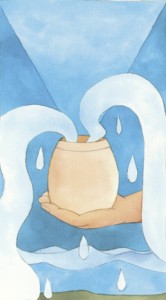 The DPP homework for February has arrived and one of the topics is Gratitude:
The DPP homework for February has arrived and one of the topics is Gratitude:
“The development and experience of gratitude is a beautiful part of awakening…..The arising of gratitude for the gifts offered by others and the rewarding experiences of life lead to a deeper sense of interconnection, happiness, well being, and often a return of generosity in response….It can further awaken our awareness of being loved, cared for, and surrounded by beauty and bounty.”
One of the assignments is to watch this 10-minute TED video by Louie Schwartzberg.
Just do it.
You won’t be sorry.
(image: Napo Tarot)
Neck-Deep in Grace
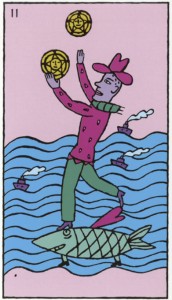 Last month’s DPP homework wasn’t just about Dependent Co-Arising. We also had readings, reflections and exercises on the nature of faith. It’s important to note that in Buddhist practice, faith does NOT require a belief in some force outside ourselves, but rather a realization that we suffer and that it might be possible for that suffering to come to an end.
Last month’s DPP homework wasn’t just about Dependent Co-Arising. We also had readings, reflections and exercises on the nature of faith. It’s important to note that in Buddhist practice, faith does NOT require a belief in some force outside ourselves, but rather a realization that we suffer and that it might be possible for that suffering to come to an end.
Here’s a passage from one of the readings by James Baraz:
“A few years ago, I had the opportunity to study with an Advaita Vedanta teacher in India named Poonja-ji. Without relying on any particular method, he simply encourages his students to rest in relaxed awareness. Poonja-ji talks about the potential to being awakened in this moment, not ten years or ten lifetimes from now.
“One day I asked him, ‘How do I know that I have a right to be enlightened, that I have enough good karma to awaken?’
“He looked at me and said, ‘You’ve come from the other side of the world with deep commitment, here to this place in India, with company of good friends and a good teacher. The Dharma is your whole life. Look around you. You are neck-deep in grace, and you’re wondering if you have enough!‘
“We are all neck-deep in grace. We share an extraordinary karma, being interested in and able to take the time to deepen our understanding, to enjoy support, and have the conditions and opportunity to practice.
“Reflecting on these blessing can deepen our faith.”
(image: Kity Kahane’s Tarot)
One Thing Leads to Another
 So what’s the point of all these links? Christina Feldman says that Dependent Co-Arising is “really the heart or the essence of all Buddhist teaching. What is described in the process is the way in which suffering can arise in our lives, and the way in which it can end…It describes a vision of life or an understanding in which we see the way everything is inter-connected — that there is nothing separate, nothing that stands alone, everything affects everything else.”
So what’s the point of all these links? Christina Feldman says that Dependent Co-Arising is “really the heart or the essence of all Buddhist teaching. What is described in the process is the way in which suffering can arise in our lives, and the way in which it can end…It describes a vision of life or an understanding in which we see the way everything is inter-connected — that there is nothing separate, nothing that stands alone, everything affects everything else.”
The Buddha described the basic principle of dependent co-arising as: When there is this, that is. With the arising of this, that arises. When this is not, neither is that. With the cessation of this, that ceases.
Christina Feldman says, “When one thing follows after another — one cycle of reaction, one cycle of response, once cycle of being locked into an opinion or a feeling or a mind-storm…when all of that is happening, there is a feeling of wandering, being pushed from one state to another, seemingly without choice, sometimes not knowing how we got there…
“This sense of wandering in confusion or blindly from one state of experience to another, one state of reaction to another, one state of contraction to another is called samsara…the movement from one state of perception and experience to another without knowing what’s going on…
“It is not unusual to have this experience…and to feel quite powerless because of the confusion present in that situation. Understanding how things come together, how they interact, actually removes that sense of powerlessness or that sense of being a victim of life or helplessness. Because if we understand how things come together, we can also begin to understand the way out, how to find another way of being, and realize that life is not random chaos.
“Another effect of understanding causes and conditions means accepting the possibility of change. And with acceptance comes another understanding that with wisdom, we have the capacity to create beneficial and wholesome conditions for beneficial and wholesome results.
“And that’s the path — an understanding that we have the capacity to make choices in our lives that lead toward happiness, that lead toward freedom and well-being rather than feeling that we’re just pushed by the power of confusion or by the power of our own misunderstanding. This understanding helps to ease the sense of separateness and isolation and it reduces delusion.”
(image: Phatansmagoric Theater Tarot)
Nothing Lasts Forever
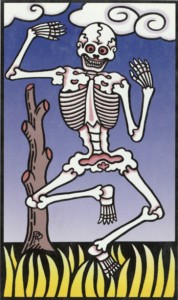 The last link in the chain of Dependent Co-Arising is jaramarana, usually translated as “aging and death.” That which arises, passes away. That which is born…dies.
The last link in the chain of Dependent Co-Arising is jaramarana, usually translated as “aging and death.” That which arises, passes away. That which is born…dies.
This is not meant to be morbid. Or depressing. It’s just the way it is. And not only for our physical being. When we identify strongly (take “birth” in) a particular state of being, we set ourselves up for the inevitable sense of loss that comes when things change.
So what to do?
Christina Feldman says, “What’s important to remember is that none of this is predetermined. Just like the climate for snow, the presence of certain of these links is going to allow other experiences to happen. Not that they must happen, or definitely will happen, but they allow for certain experiences to happen.”
She describes the Third Noble Truth (that there is an end to suffering) as a “portrayal of the way in which it is possible to step off a sense of being bound to this wheel of samsara or to the links of dependent origination. It is significant to remember that it doesn’t have to be any one link that we step off of, or that there is only one place where we can get out of the maze. In fact, we can step out of the maze and into something else at any one of these links.”
Jaramarana is also translated as “aging and dying, grief, sorrow, suffering, lamentation and despair.” Whew. For the DPP homework, I think I’m going to keep it simple: “death.”
(image: Buddha Tarot)
Here I Am
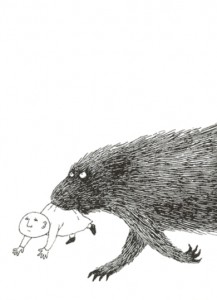 The next link on the chain of Dependent Co-Arising is jati, which translates as “birth.” This is the “moment of arrival,” the sense of “I’ve got it!” or “this is who I am.”
The next link on the chain of Dependent Co-Arising is jati, which translates as “birth.” This is the “moment of arrival,” the sense of “I’ve got it!” or “this is who I am.”
Christina Feldman says that this is the moment of “emergence of an identity, a sense of self that rests upon identifying with a state of experience or mode of conduct…the do-er, the thinker, the seer, the knower, the experiencer…..the sufferer.”
Suffering is, of course, what eventually happens. Because being someone or something always comes with the stress of defending that state, with trying to keep it going, or controlling it in some way. Which can not be sustained.
That which arises, passes away.
This leads us to the next link of the chain (coming tomorrow).
Stay tuned.
(image: detail from illustration by Edward Gorey)
Drum Roll, Please
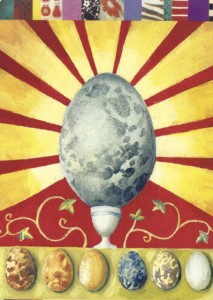 The next link in the chain of Dependent Co-Arising is bhava, usually translated as “becoming.” When we cling to the idea that something….or someone….can make us happy (or unhappy), or that our views/opinions/beliefs are RIGHT (and therefore need to be defended), or we when hold onto some idea about who we are and the way things SHOULD be — then we have started to become that belief.
The next link in the chain of Dependent Co-Arising is bhava, usually translated as “becoming.” When we cling to the idea that something….or someone….can make us happy (or unhappy), or that our views/opinions/beliefs are RIGHT (and therefore need to be defended), or we when hold onto some idea about who we are and the way things SHOULD be — then we have started to become that belief.
Here’s what Christina Feldman says, “Clinging is followed by becoming — the entire process of fixing or positioning the sense of self in a particular state of experience. Any time we think in self-referential terms…’I am angry,’ ‘I am loving,’ ‘I am greedy,’ etc….an entire complex of behavior is generated to serve craving and clinging. I see something over there that I’ve projected as the thing ‘that is going to make me really happy if I get it,’ and then I organize my behavior, my actions and my attention in order to find union with that. This is the process of becoming — becoming someone or something other that what is.”
Bhava is also translated as “being,” or “arising,” but I’ve gotten used to “becoming” as the standard translation, so for the DPP homework, I’m sticking with that.
(image: this is one of those old cards I’ve had in my collection for years. I don’t know who to credit.)

